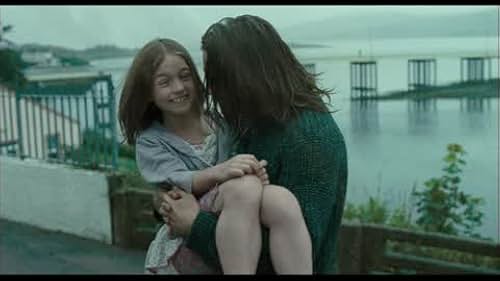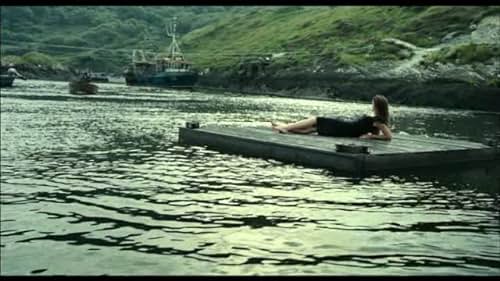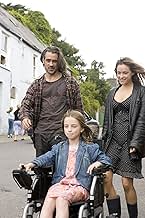An Irish fisherman discovers a woman in his fishing net whom his precocious daughter believes to be a selkie.An Irish fisherman discovers a woman in his fishing net whom his precocious daughter believes to be a selkie.An Irish fisherman discovers a woman in his fishing net whom his precocious daughter believes to be a selkie.
- Awards
- 6 wins & 6 nominations
- Director
- Writer
- All cast & crew
- Production, box office & more at IMDbPro
Storyline
Did you know
- TriviaColin Farrell and Alicja Bachleda dated while shooting the film, and had a son a year later. But they broke up in 2010.
- GoofsSyracuse sets an empty vodka bottle at his feet while on the island with the lighthouse. When he walks away from Ondine the bottle is still there. However, after a cut to show Syracuse starting up the boat and back to Ondine hearing the boat and jumping up, the bottle is nowhere to be seen. Ondine could have thrown it away in between, but there's no sign that she moved at all.
- ConnectionsFeatured in The Rotten Tomatoes Show: Kick-Ass/Death at a Funeral/The Joneses (2010)
- SoundtracksOne Quiet Night
Written by Pat Metheny (as Patrick B. Metheny)
Performed by Pat Metheny
(c) Pat Meth Music Corp.
Administered by Kobalt Music Publishing Ltd
Licensed courtesy of Warner Music UK Ltd
Featured review
Everything about Neil Jordan's Ondine, a middling good and very Irish expression of his unique vision, is soft around the edges, like the lilting speech of County Cork, where the action takes place, by the sea, whose gentle waters (hithering and thithering waters of, Joyce called the Liffey) deliver a girl into a fisherman's net. Is she a real girl ("one of those asylum seekers," her finder asks) or a selkie or an ondine, a sea nymph, a mermaid temporarily gone human? The distinctions have gone blurry, and the movie swings between fairy tale and a harsh account of modern realities. Ondine succeeds or fails by virtue of its gentleness and deliberately blurred distinctions. It's a nice little story but a fragile one, so understated and gentle it could pass unnoticed if you don't pay good attention; and the accents are so thick we could have very much benefited by having subtitles. Once again it shows this director remains his own man, true to his literary roots and his Irish ones when he wants to be.
The fisherman is Syracuse (Colin Farrell), but his name has been rounded off to "Circus," and Farrell has softened back his voice to an (often incomprehensible) Irish murmur. He says they call him "Circus" because as a drunk he was such a clown. He's been sober for two years, ten months, and 21 days and counting, but he's treading water, in need of something. Circus has a daughter, Annie, whom he cares for, but she lives with her mother, and he lives by himself, and he's too warm and friendly a fellow for that to be right for him. He lives on the edge, a bit uneasily, between sobriety and drunkenness, solitude and a marital state, happiness and bitter disappointment. When he pulls the mysterious female out of the water, she offers hope of something new.
Neil Jordan has always had a gift for transformation and blurred edges. In his very first film, a mild-mannered musician, played by Stephen Rea, changes into a revenge killer, his trumpet morphed into a gun. A Jordan regular forever after and virtually his muse, Rea has been described by Todd McCarthy in terms of ambiguity: "handsome-homely, decisive-passive, gentle-violent." It's true you don't know quite how to take Stephen Rea half the time, and that's the beauty of him. Jordan's most celebrated film, The Crying Game, veers with pleasing and surprising complexity between opposites of sex and politics, keynoted by the fascinatingly androgynous Jaye Davidson. The Irish novelist-turned-auteur filmmaker has dealt in the past with mythical transforming creatures in Interview with the Vampire and In the Company of Wolves.
Ondine is in a lower key, however. The shapely and mysterious young woman Circus catches in his net (Alicja Bachleda, a Polish actress born in Mexico) can't be pinned down. Not, at least, till till the action finale, which brings things to a conclusion with a series of happy accidents. As Circus may have hoped, she becomes a source of luck. Ondine is what she says her name is. When she goes out fishing with Circus, her singing seems to fill his pots with lobsters and his net with salmon. He desires her. He likes dressing her up in nice clothes. When the two of them make wishes, Ondine wishes for Annie to get well. Circus wishes for Ondine to stay. She doesn't want to be seen and he hides her in an isolated cottage once occupied by his late lamented mother.
The plucky, smart, and over-imaginative young Annie (Alison Barry) goes to the library and studies up on selkies. She rolls around in a wheelchair that gets stuck in the water at one point. While she's the most threatened -- she could die at virtually any moment -- Annie is, paradoxically, the strongest person around. The wheelchair she has to travel in hides that her feet are planted firmly on the ground. She's also like a sea-nymph herself, surviving life on earth uncertainly, only by constant dialysis sessions. Of course Stephen Rea is here, and this time he's a Catholic priest. Circus goes to him for confession, but not quite confession: he seems to confuse his sessions with the good Father with AA meetings. These are moments of contemplation, as are, perhaps, Circus' attempts to tell Annie a fairy tale based on what he's actually experienced, but there's a feeling that events are moving forward rapidly and strangely. "Curiouser and curiouser," Anne repeats, echoing Lewis Carroll. But really things are in a slow drift, till the end comes and they're rushed to a conclusion.
That final revelation when bad men turn up may not be so surprising, but what remains of Ondine is its delicacy and sweetness. Ondine herself does seem for a while a creature of the sea, in a very down-to-water fashion. She likes to get wet in the sea. She sets the fashion of wearing thin, wet dresses and she looks great in them, though there's a voyeuristic note in those scenes, as if she's just being posed to titillate the audience. The film seems, not for the first time in Neil Jordan's work, to be more interested in atmosphere than anything else; there's plenty of that, but not much depth in the characters or the action. Jordan pays good attention to his visuals and brings in the best d.p.'s to help him. That first film was shot by Chris Menges and this one by Christopher Doyle. The appropriately feathery camera-work never strikes a note of Irish Tourist Office cliché. Too bad the images, though soft and blurry, are clearer than the dialogue.
_________________
The fisherman is Syracuse (Colin Farrell), but his name has been rounded off to "Circus," and Farrell has softened back his voice to an (often incomprehensible) Irish murmur. He says they call him "Circus" because as a drunk he was such a clown. He's been sober for two years, ten months, and 21 days and counting, but he's treading water, in need of something. Circus has a daughter, Annie, whom he cares for, but she lives with her mother, and he lives by himself, and he's too warm and friendly a fellow for that to be right for him. He lives on the edge, a bit uneasily, between sobriety and drunkenness, solitude and a marital state, happiness and bitter disappointment. When he pulls the mysterious female out of the water, she offers hope of something new.
Neil Jordan has always had a gift for transformation and blurred edges. In his very first film, a mild-mannered musician, played by Stephen Rea, changes into a revenge killer, his trumpet morphed into a gun. A Jordan regular forever after and virtually his muse, Rea has been described by Todd McCarthy in terms of ambiguity: "handsome-homely, decisive-passive, gentle-violent." It's true you don't know quite how to take Stephen Rea half the time, and that's the beauty of him. Jordan's most celebrated film, The Crying Game, veers with pleasing and surprising complexity between opposites of sex and politics, keynoted by the fascinatingly androgynous Jaye Davidson. The Irish novelist-turned-auteur filmmaker has dealt in the past with mythical transforming creatures in Interview with the Vampire and In the Company of Wolves.
Ondine is in a lower key, however. The shapely and mysterious young woman Circus catches in his net (Alicja Bachleda, a Polish actress born in Mexico) can't be pinned down. Not, at least, till till the action finale, which brings things to a conclusion with a series of happy accidents. As Circus may have hoped, she becomes a source of luck. Ondine is what she says her name is. When she goes out fishing with Circus, her singing seems to fill his pots with lobsters and his net with salmon. He desires her. He likes dressing her up in nice clothes. When the two of them make wishes, Ondine wishes for Annie to get well. Circus wishes for Ondine to stay. She doesn't want to be seen and he hides her in an isolated cottage once occupied by his late lamented mother.
The plucky, smart, and over-imaginative young Annie (Alison Barry) goes to the library and studies up on selkies. She rolls around in a wheelchair that gets stuck in the water at one point. While she's the most threatened -- she could die at virtually any moment -- Annie is, paradoxically, the strongest person around. The wheelchair she has to travel in hides that her feet are planted firmly on the ground. She's also like a sea-nymph herself, surviving life on earth uncertainly, only by constant dialysis sessions. Of course Stephen Rea is here, and this time he's a Catholic priest. Circus goes to him for confession, but not quite confession: he seems to confuse his sessions with the good Father with AA meetings. These are moments of contemplation, as are, perhaps, Circus' attempts to tell Annie a fairy tale based on what he's actually experienced, but there's a feeling that events are moving forward rapidly and strangely. "Curiouser and curiouser," Anne repeats, echoing Lewis Carroll. But really things are in a slow drift, till the end comes and they're rushed to a conclusion.
That final revelation when bad men turn up may not be so surprising, but what remains of Ondine is its delicacy and sweetness. Ondine herself does seem for a while a creature of the sea, in a very down-to-water fashion. She likes to get wet in the sea. She sets the fashion of wearing thin, wet dresses and she looks great in them, though there's a voyeuristic note in those scenes, as if she's just being posed to titillate the audience. The film seems, not for the first time in Neil Jordan's work, to be more interested in atmosphere than anything else; there's plenty of that, but not much depth in the characters or the action. Jordan pays good attention to his visuals and brings in the best d.p.'s to help him. That first film was shot by Chris Menges and this one by Christopher Doyle. The appropriately feathery camera-work never strikes a note of Irish Tourist Office cliché. Too bad the images, though soft and blurry, are clearer than the dialogue.
_________________
- Chris Knipp
- Jun 11, 2010
- Permalink
Details
- Release date
- Countries of origin
- Official site
- Languages
- Also known as
- Chuyện Tình Biển Xanh
- Filming locations
- Production companies
- See more company credits at IMDbPro
Box office
- Budget
- $12,000,000 (estimated)
- Gross US & Canada
- $550,472
- Opening weekend US & Canada
- $27,497
- Jun 6, 2010
- Gross worldwide
- $1,790,061
- Runtime1 hour 51 minutes
- Color
- Sound mix
- Aspect ratio
- 1.85 : 1
Contribute to this page
Suggest an edit or add missing content






















